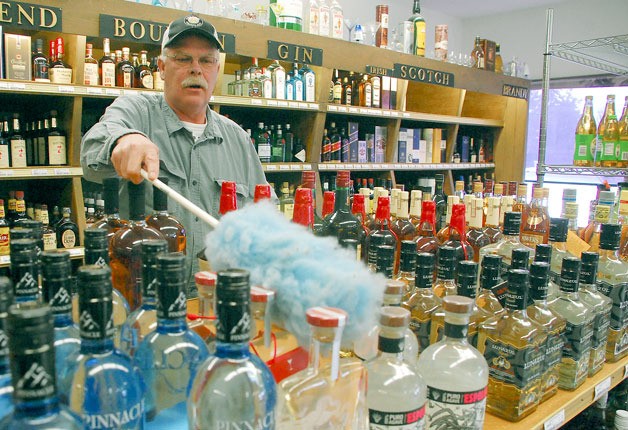Booze will soon start flowing out of some of South Whidbey’s largest grocery stores in June, leaving the fate of traditional small liquor stores in question.
Due to Initiative 1183, which voters approved in November, the state must get out of the liquor business by June. At that time, stores larger than 10,000 square feet can start selling hard alcohol in addition to the beer and wine they currently offer.
At least nine Whidbey Island businesses have applied for licenses that will allow for the sale of spirits. On South Whidbey, those include the Star Store in Langley, Payless Foods in Freeland, the Goose Community Grocer in Bayview, and the smaller Bailey’s Corner Store near Cultus Bay.
Others on the island include Albertson’s, Safeway, Saar’s Market Place, Walmart, and Walgreens in Oak Harbor, and Prairie Center Red Apple in Coupeville, according to information from the Washington State Liquor Control Board.
“I didn’t want to be at a competitive disadvantage with other stores on the island,” said Gene Felton, owner of the Star Store in Langley, explaining the rationale for applying for a license. He expects to offer a modest selection of liquor in the store’s beer and wine section.
Felton said he doesn’t want to directly compete with the existing liquor stores on Whidbey Island, but feels he must offer similar choices to other grocery stores.
Freeland Liquor Store owner Ken Vaughan declined to speculate on how the expansion of businesses able to sell liquor on Whidbey will affect his business. South Whidbey’s biggest grocery store, Payless, is just down the street.
“It’s really a crap shoot now,” Vaughan said, adding that he is going to diversify his selection of alcohol, but admitted he can’t know how many of his customers will switch to buying from a larger supermarket.
Vaughan did note liquor prices will increase for consumers because of the initiative. Distributors will have to pay a 10 percent license fee and retailers will have to pay a 17 percent license fee. Those two fees will be passed on to consumers.
Greg Saar, owner of Saar’s Market Place on Highway 20 in Oak Harbor, said the initiative transformed the state from one of the most restrictive places to sell alcohol into one of the most flexible.
He is planning to have 40 feet of shelf space devoted to liquor and doesn’t have to provide any additional training for his staff.
Ken Hofkamp, owner of Prairie Center Red Apple in Coupeville, acknowledged he has applied for a liquor license, but he isn’t sure yet if he will expand into alcohol sales.
With so many businesses on Whidbey Island planning to expand into liquor sales, Saar doesn’t believe it will mean a big boost in revenue. There will simply be more businesses meeting a demand that was originally filled by scattered liquor stores.
Meanwhile, small liquor operators are scrambling to understand the new regulations and whether the rules will benefit their operations.
“It’s been really hard with all of the changes,” said Beverly Heising, who owns Whidbey Island Distillery on South Whidbey Island with her husband Steve.
The small distillery on Craw Road produces a loganberry liqueur that is sold to various liquor stores and restaurants on Whidbey Island.
Whidbey Island Distillery produces only one barrel of its loganberry spirits per month, and that isn’t enough to spark the interest of distributors, she said. They’ll have to self-distribute to local businesses and to a couple of liquor stores off the island.
One big change kicked in March 1, when restaurants could legally buy hard liquor directly from distilleries and distributors instead of the state, which formerly had a monopoly on such sales.
Prior to the approval of Initiative 1183, Heising could sell her product to the state for distribution to its stores. With the change, Whidbey Island Distillery will have to deliver directly to each off-island business that orders its product. She said she doesn’t know yet what effect privatization will have on her prices.
Another small businessman has concerns liquor privatization is going to cause problems.
“It’s going to be a hassle,” said Scott Fraser, owner of Oak Harbor’s Frasers Gourmet Hideaway. He was concerned distributors won’t bother selling to a small business with a limited use of alcohol, though he said one of his wine distributors is expanding into alcohol sales.
Fraser was also concerned that the supermarkets’ expansion into the liquor market will only offer the most popular varieties of booze and not the specialty items he uses for many of his drinks.
“It’s going to be a bit of a challenge for us,” Fraser said.
Heising said each change that has been implemented over the months has caused a lot of confusion as she tries to keep up with regulations and how to pay taxes associated with her distillery.
More than 58 percent of the voters statewide approved the initiative and 64.5 percent of the voters in Island County voted in favor of it. It’s been challenged in court, but a judge last week upheld the initiative.
As businesses prepare for the change, the state is busy auctioning off its liquor stores. Currently, a six-week online auction is taking place to buy the rights to sell liquor out of the state stores, including the state store in Oak Harbor.


